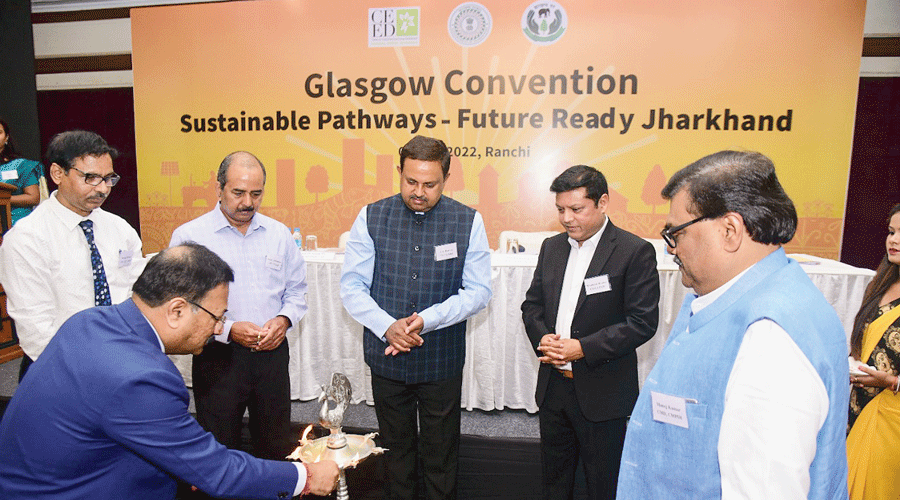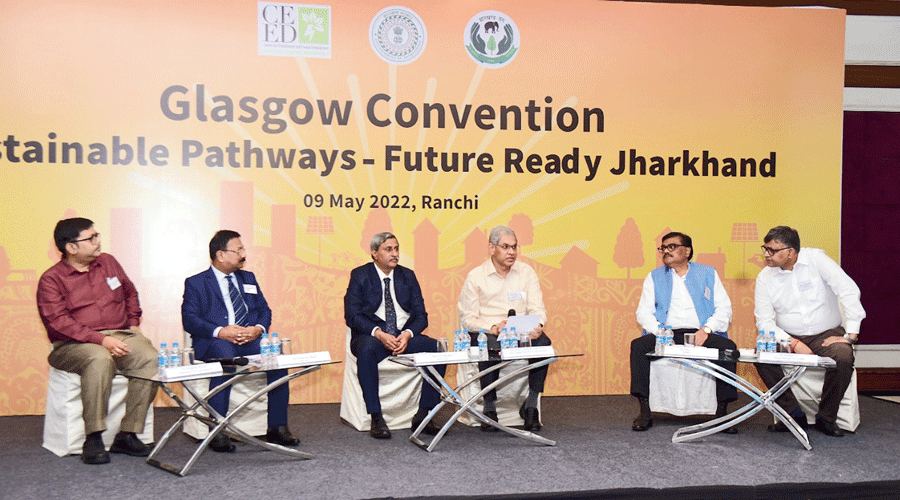A state-level conference was organised jointly by the forest department, Jharkhand, and the Centre for Environment and Energy Development in Ranchi with the key objective to bring forth the broader vision and solutions to achieve growth trajectory and environmental sustainability in the state.
The conference, “Sustainable Pathways for Future Ready Jharkhand”, unanimously recommended that a special task force/commission must be constituted by the state government with representations from the government, private sector, academicians and civil society to streamline the transition process to enable Jharkhand future-ready.
Incidentally, the workshop was organised in the light of goals of the Glasgow Convention (Conference of Parties-26 held in 2021), where Government of India has pledged to achieve the net zero emission by 2070, similarly constructive discussion pondered over new opportunities for India in general and Jharkhand in particular.
Elaborating on the broader context of the conference, Principal Chief Conservator of Forest (PCCF) and chairman, Jharkhand State Pollution Control Board (JSPCB) A.K. Rastogi said: “This is a defining moment for all of us since Jharkhand is one of the first states in India that is taking the lead in formulating pathways for creating a futuristic economy. We essentially need a green vision and a new development model that puts sustainability, inclusivity and public interest at the centre stage.”

CMD BCCL Samiran Dutta lights the lamp as other dignitaries look on during inauguration of the conference in Ranchi on Monday. Manob Chowdhury
While further elaborating about the initiative, Rastogi highlighted that, “The current development paradigm based on fossil fuel is poised to be changed in favour of environmentally sustainable models. We also need to look for alternative sources of energy for other sectors such as steel and cement, etc.”
“In order to define this transition in the state, the forest department can play a positive role,” he concluded.
Climate change impacts threaten the long-term socio-economic goals and undermines the ability of people to live in a stable and prosperous world. Net zero, or becoming carbon neutral is one of major pathways, where energy transition will play a key role. In such a scenario, it is important to initiate constructive dialogue to discuss farsighted plans that account for technical, social, and economic transition in the state.
Speaking on the occasion, Ramapati Kumar, CEO of CEED said that, “This path-breaking initiative taken by the forest department is really commendable and the need of the hour. For creating a forward looking economy, there is an urgent need to have a special task force or a commission that should be given mandate to map out the magnitude of ensuing impacts and prospective opportunities in the transition phase through a series of studies and stakeholders consultations for an informed public policy discussion and decision making process.”
Addressing the conference, chairman cum managing director Central Coalfields Limited (CCL) P.M. Prasad, stated that, “The coal industry wholeheartedly will support the transition process and will move towards the net zero path as per the frameworks and guidelines suggested by the Government of India.”
Tata Steel vice-president (Safety, Health & Sustainability), Sanjiv Paul lauded the initiative taken by the department and said that, ‘Tata groups stands for any kind of sustainable transition which overall help economy, society and the well being of the state and we will always support key measures taken by the central and state government in this regard.”
In the conference, the first session (environmental, social, governance related challenges in Jharkhand) discussed climate risks and the prospect of decarbonisation in the backdrop of the phase down of coal. The second session (desertification and natural landscape restoration) broadly looked at the policy intervention and action points to rejuvenate the land and forest. The third session (coal production scenario and energy security) explored energy security in the wake of resource depletion and promotion of renewables to make energy mix cleaner. The fourth session (diversification of economy: challenges, opportunity and pathways) laid emphasis on identifying emerging sectors, required financing, skill enhancement and localised jobs with facilitating social infrastructure in the state.
The conference concluded that key barriers and enablers will have to be identified during the sustainable transition process through a multi-stakeholder engagement and there should be collective effort for creating farsighted policies and plans to mitigate negative impacts and facilitate sustainable developments in future.










